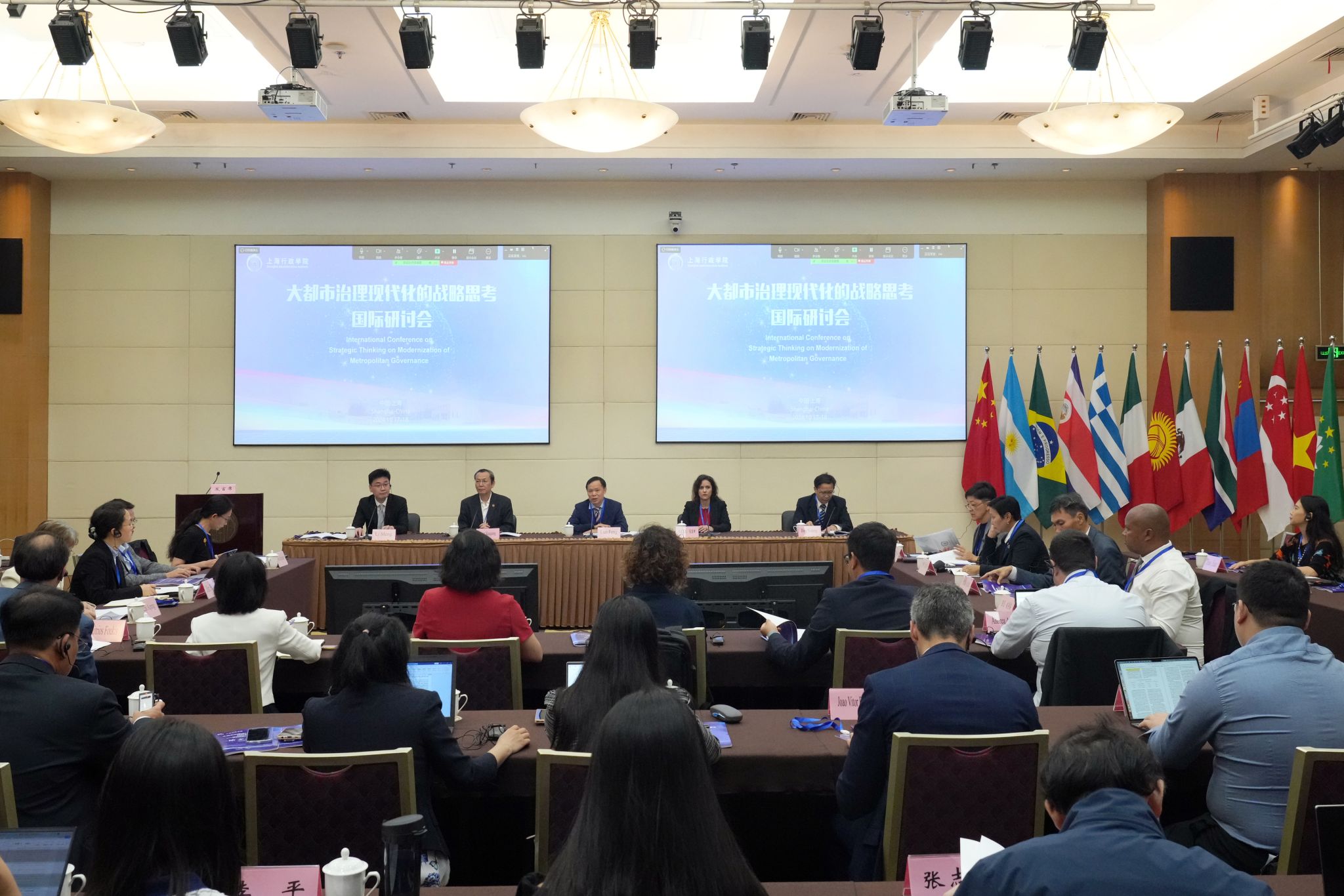On October 17th and 18th, the International Conference on Strategic Thinking on Modernization of Metropolitan Governance was held in Shanghai Administration Institute. In a new era of deepening globalization and digitalization, how to promote the modernization of metropolitan governance and thus achieve a prosperous and harmonious city with sustainable development has become a major issue facing the world at large. This international conference invited more than 70 Chinese and foreign experts and scholars from 13 countries and regions around the world, including Brazil, Argentina, South Africa, Greece, Vietnam, and Kyrgyzstan. They conducted in-depth online or offline exchanges and heated discussions on the topic of Strategic Thinking on Modernization of Metropolis Governance.

Professor LUO Feng, Vice President of Shanghai Administration Institute, attended the opening ceremony and delivered a speech. He pointed out that Shanghai is going all out for the modernization of metropolitan governance system and capacity with resolve and intensity as never before, in an effort to build a modern socialist international metropolis with global influence. The important mission will be centered on building an international hub of economy, finance, trade, shipping, and scientific and technological innovation. Sustained efforts will be made to boost the city’s overall urban capacity and core competitiveness. To this end, Shanghai has been working to meet the highest standards and the best level, with a view to further deepen the reform and opening up comprehensively at a higher starting point.
The keynote speeches were delivered by Betânia Lemos, President of the National School of Public Administration of Brazil (ENAP), and Professor WANG Youqiang, Director of the School of Public Policy & Management, Tsinghua University and Director of Shanghai International Innovation Center of Tsinghua University. Betânia Lemos said that with the innovation and development of urban governance model, social involvement has become an integral part of government governance in this day and age. Despite their different national conditions, China and Brazil shared similar goals in fostering social involvement in urban governance by striving to get more people engaged in urban development.
According to Professor WANG Youqiang, we should uphold a people-oriented approach and give full play to innovation so as to pave the way for a modern metropolitan governance via society, management, activities, resources, and technology. Coordinated development of government, market, and society should be enhanced based on division of labor, collaboration, technology, system, and culture, during which a systemic, holistic, efficient, and sustainable mindset will be adopted. We should always make clear the vital functions of social involvement, technological innovation, and international cooperation in facilitating the modernization of metropolitan governance, highlight the important role of social involvement in urban governance, and actively advocate the establishment of an urban governance model based on diversity and multi-participation.
There were four sub-forums in this conference, focusing on International Comparison and Cooperation in Metropolitan Governance, Intergovernmental Relations and Governance in Metropolises, Policies and Mechanisms for Green Transformation of Innovative Urban Development, and Research on Digital Governance in Metropolises. Speeches were made on the cases and experience of modernized metropolitan governance in their respective countries and regions by Germán Pinazo, Vice Rector of the National University of General Sarmiento (UNGS), Argentina, Johnny Pietersen, Director of Research of the National School of Government (NSG), South Africa, Asya Polponova, Professor of the Academy of Public Administration under the President of the Kyrgyz Republic (APAPKR), Andrea Apolloni, Professor of Sapienza University of Rome, Italy, SHUI Bing, Professor of the Faculty of Law and the Associate Director of the Institute of Advanced Studies in Humanities and Social Sciences, University of Macau, YI Chengzhi, Professor of the School of International and Public Affairs, Shanghai Jiao Tong University, RONG Zhi, Professor of the School of Political Science & Public Administration, Wuhan University, and YE Lan, Associate Professor of the Department of Public Administration, Shanghai Administration Institute.
Professor WANG Yongjie, Vice President of Shanghai Administration Institute, attended the closing ceremony and made a summary. He said that results have been achieved and academic consensus reached in this conference in the following aspects: first, we should “put people first” for the modernization of metropolitan governance; second, the reform of governmental institutions and mechanisms needs to be deepened for the modernization of metropolitan governance; third, we must follow the sustainable development philosophy for the modernization of metropolitan governance; fourth, the critical path of “digital empowerment” should be pursued for the modernization of metropolitan governance.
Participating experts believed that digital governance technology should be actively utilized to carry out in-depth thinking and forward-looking planning on the path of modernization of metropolitan governance in the new era. Through technological innovation and theoretical empowerment, we can further improve the capacity of urban governance and contribute more to metropolitan governance.